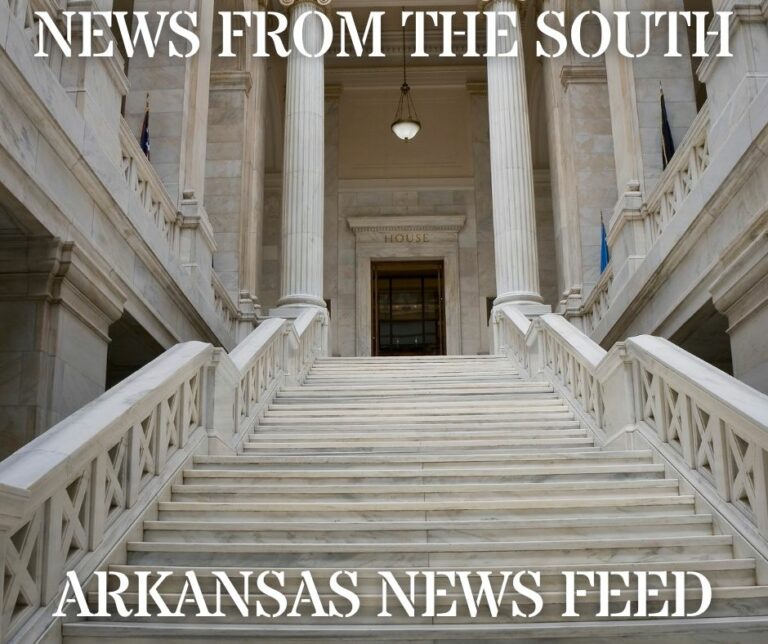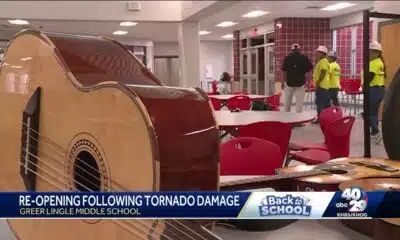News from the South - Louisiana News Feed
Scientific research cuts could be ‘devastating” to Louisiana, higher ed leaders warn
by Piper Hutchinson, Louisiana Illuminator
May 6, 2025
Louisiana would be among the states hardest hit by the indefinite pause of funding from the National Science Foundation, with higher education leaders warning of catastrophic impacts to students and the economy.
According to an internal memo exclusively reported by Nature, the National Science Foundation, one of the top federal funders of scientific research at Louisiana universities, is pausing funding of all existing grants and will stop awarding new grants. The agency announced it will also slash its indirect cost rate to 15%, joining the National Institutes of Health and the Department of Energy in doing so. Those cuts will result in tens of millions of dollars in loss for Louisiana universities.
Last year, LSU was awarded the largest-ever grant in NSF history. The 10-year nearly $160 million grant is funding the Future Use of Energy in Louisiana partnership, which brings together multiple universities and private industry partners and provides workforce development grants for the energy industry.
In the 2023 fiscal year, the most recent year that data is available, the National Science Foundation awarded over $54 million in grants to Louisiana universities. Each dollar spent on research is estimated to have triple the fiscal impact, according to numerous economic impact studies published by universities.
“We believe it will have a significant impact on our innovation, our workforce development and our economic development,” Ramesh Kolluru, vice president of research, innovation and economic development at the University of Louisiana at Lafayette, said in an interview with the Illuminator.
Jim Henderson, president of Louisiana Tech University, said NSF funds research with direct economic impact for Louisiana, such as solutions to problems that affect forestry – the leading agricultural sector in Louisiana. Losing that money would leave a hole that might be hard to fill, Henderson said.
“Louisianans [would be] looking for ways to replace that intellectual capital that makes our state livable,” Henderson said.
GET THE MORNING HEADLINES.
‘Leaves and insects aren’t woke’
Among the nearly 1,500 grants the National Science Foundation has cancelled in the past two weeks was a nearly $200,000 grant awarded to Julia Earl, a Louisiana Tech biology professor. The agency gave no reason for cancelling its contract other than a change in its priorities, she said.
Henderson said he believed the grant was targeted as part of the Trump administration’s efforts to defund diversity, equity and inclusion. Though the project was not DEI-related, it has the word diversity twice in its title: “Effects of Leaf Diversity on Aquatic Insect Colonizer Diversity.”
“I dare say that leaves and insects aren’t woke by any stretch of the imagination,” Henderson said. “What it is is a study on the habitats, the aquatic biospheres, that are so vitally important to Louisiana.”
Earl said she was forced to fire two undergraduate students she had hired to work on the project because she lost the NSF funding.
Losing such grants “reduces our ability to train the workforce,” Earl said. “They’re learning valuable skills that they could use in jobs, and so most of our students at Louisiana Tech are from Louisiana, so students in our state are not getting that training without these grants.”
Students among hardest hit
In addition to undergraduate students, research grants pay for tuition and stipends for graduate and doctorate students who work on the projects. While some universities are looking into stopgap measures to pay students currently enrolled, the loss of funding is likely to block the pipeline of students being educated at Louisiana universities.
“Graduate students are the bread and butter of our research programs,” Kolluru said.
Parampreet Singh, an LSU physics professor funded by the National Science Foundation, said he is unsure how he will support his graduate research students moving forward. Even if universities can provide short-term funding in the form of teaching assistantships, it may not be enough for students early in their five- or six-year Ph.D. programs if the loss of NSF funding is a long-term problem.
“If the labs shut down because of NSF funding restrictions, we’re not going to complete their research,” Singh said. “Their careers are just getting destroyed in the process.”
LSU President William Tate told The Advocate that all admissions offers the university now makes to prospective graduate students are conditional on funding.
“That’s a very precarious situation because you’re talking about the most talented students in the country,” Tate said. “You’re basically telling them they have a conditional opportunity to go to our school as opposed to saying you’re definitively coming and we’re going to help you get a Ph.D. in physics or astronomy or microbiology or agriculture.”
The National Science Foundation also funds the Louis Stokes Louisiana Alliance for Minority Participation, a statewide program aimed at increasing the number and quality of minority students enrolling in and completing undergraduate degrees in the science, technology, engineering and math fields.
The foundation had already asked the state to stop work on this program, though the Board of Regents, which administers the funding, advised participating schools they are allowed to continue their work, though they do so at the risk of not being reimbursed if the NSF terminates its awards retroactively.
‘We had a contract with the government. They didn’t honor it.’
Changes in federal research funding that have unfolded since President Donald Trump took office in January are a major reversal of nearly a century of higher education norms. The sudden rescission of contracts leaves universities, especially those already in a precarious financial position, in the lurch. And it strikes some as counter to Trump’s assertions he wants to run the federal government like a business.
“We had a contract with the government, basically, and they didn’t honor it,” Earl said about the end of her NSF grant.
Tate echoed that same thought at an LSU Board of Supervisors meeting earlier this year.
“We put up, if you will, a loan. We loan [the federal government] our facilities, and today we find ourselves in a situation where those facilities that are on loan, the reimbursement has changed in real time while we’re in a contract,” Tate said.
While critics have argued federal funding should not go to scientific research without direct applications, most scientists agree there is no applied research without basic science.
Investing in research now is necessary for the applied science of the future, Jonathan Snow, an LSU geology professor, said in an interview earlier this year. While the value of basic scientific research might not be readily apparent to the public, scientists are in agreement that the work is necessary for life-saving discoveries and other scientific breakthroughs.
“Basic science basically won World War II,” Snow said. “Basic science drove innovation in all kinds of war-making technologies, from radar to the atomic bomb.”
YOU MAKE OUR WORK POSSIBLE.
Louisiana Illuminator is part of States Newsroom, a nonprofit news network supported by grants and a coalition of donors as a 501c(3) public charity. Louisiana Illuminator maintains editorial independence. Contact Editor Greg LaRose for questions: info@lailluminator.com.
The post Scientific research cuts could be ‘devastating” to Louisiana, higher ed leaders warn appeared first on lailluminator.com
Note: The following A.I. based commentary is not part of the original article, reproduced above, but is offered in the hopes that it will promote greater media literacy and critical thinking, by making any potential bias more visible to the reader –Staff Editor.
Political Bias Rating: Center-Left
The article primarily reports on the impact of federal funding cuts to Louisiana’s higher education and research programs, specifically focusing on the consequences for universities and students. While it presents a factual account of the funding cuts and their potential economic and educational effects, there is subtle framing that aligns with a critique of the Trump administration’s policies, particularly in regard to diversity and inclusion efforts. The inclusion of quotes from university leaders expressing concern over these cuts, along with the mention of how basic science contributes to technological advancements, suggests a sympathetic stance toward the value of scientific research and public funding for education, reflecting a Center-Left perspective on the issue.
News from the South - Louisiana News Feed
New immigrant-tracking laws take effect in Louisiana
SUMMARY: Two new Louisiana laws, effective mid-2025, require state agencies and public colleges to collect and share data on undocumented immigrants, including reporting ineligible applicants for benefits to federal immigration authorities. Act 419 mandates tracking immigration status of those using state services, while Act 351 requires reporting applicants denied benefits like SNAP or Medicaid to ICE. These laws follow federal efforts to expand data collection, raising fears that immigrant families, including those with U.S. citizen children, may avoid public benefits out of fear. Implementation details remain unclear, causing concern among immigrant advocates about increased isolation and chilling effects on access to essential services.
The post New immigrant-tracking laws take effect in Louisiana appeared first on thecurrentla.com
News from the South - Louisiana News Feed
Hurricane Erin to grow larger as two other tropical spots linger behind
SUMMARY: Hurricane Erin is intensifying in the western Atlantic with 110-mph winds, located 665 miles southwest of Bermuda. The National Hurricane Center forecasts it will move north-northwest then northeast, passing east of the Bahamas and between the U.S. East Coast and Bermuda. Currently a Category 2 hurricane, Erin may fluctuate in strength while expanding. Hurricane-force winds extend 80 miles from its center, with tropical storm-force winds reaching 205 miles. Tropical Storm Warnings and Watches are active for parts of the Bahamas and North Carolina, where mandatory evacuations have been ordered for Hatteras and Ocracoke Islands. Two other tropical disturbances in the Atlantic show potential for development later this week.
The post Hurricane Erin to grow larger as two other tropical spots linger behind appeared first on wgno.com
News from the South - Louisiana News Feed
Landry pledges Louisiana National Guard troops for Trump’s DC takeover
by Greg LaRose, Louisiana Illuminator
August 19, 2025
Gov. Jeff Landry has approved sending 135 members of the Louisiana National Guard to Washington, D.C., in support of President Donald Trump’s takeover of the city’s police department.
More than 1,000 National Guard soldiers from multiple states have been directed to the nation’s capital since Trump declared a “crime emergency” there, despite its violent crime rate reaching a 30-year low.
“We are a nation of law and order. Our capital is a reflection of our nation’s respect, beauty, and standards,” Landry wrote Monday in a social media post. “We cannot allow our cities to be overcome by violence and lawlessness. I am proud to support this mission to return safety and sanity to Washington DC and cities all across our country, including right here in Louisiana.”
The governor did not indicate how long Louisiana’s guard members will be deployed. The part-time soldiers typically hold separate full-time jobs they must leave behind when on assignment.
In addition Louisiana, Mississippi Gov. Tate Reeves will send 200 of his National Guard members to Washington; Ohio Gov. Mike DeWine will send 150 members his state’s National Guard; South Carolina Gov. Henry McMaster approved 200 members; and West Virginia Gov. Patrick Morrisey will send up to 400 National Guard members.
In addition to deploying the National Guard to Washington, Trump has leaned on the district’s Home Rule Act to have the 3,400-person Metropolitan Police Force assist in immigration enforcement.
Trump’s emergency order expires in about three weeks, but he has said he intends to extend it and ask Congress to pay for the effort.
Louisiana Illuminator is part of States Newsroom, a nonprofit news network supported by grants and a coalition of donors as a 501c(3) public charity. Louisiana Illuminator maintains editorial independence. Contact Editor Greg LaRose for questions: info@lailluminator.com.
The post Landry pledges Louisiana National Guard troops for Trump’s DC takeover appeared first on lailluminator.com
Note: The following A.I. based commentary is not part of the original article, reproduced above, but is offered in the hopes that it will promote greater media literacy and critical thinking, by making any potential bias more visible to the reader –Staff Editor.
Political Bias Rating: Right-Leaning
The content highlights support for law and order and applauds the deployment of National Guard members to Washington, D.C., under President Trump’s directive. It presents this action positively by quoting Governor Jeff Landry’s statements that emphasize restoring safety and combating violence, aligning with conservative priorities. The framing is generally supportive of Trump’s approach, reflecting a right-leaning perspective without overtly partisan language or deep critique of opposing views.
-
News from the South - Tennessee News Feed4 days ago
GRAPHIC VIDEO WARNING: Man shot several times at point-blank range outside Memphis convenience store
-
News from the South - Texas News Feed4 days ago
Kratom poisoning calls climb in Texas
-
News from the South - Texas News Feed2 days ago
New Texas laws go into effect as school year starts
-
News from the South - Florida News Feed2 days ago
Floridians lose tens of millions to romance scams
-
News from the South - Kentucky News Feed4 days ago
Unsealed warrant reveals IRS claims of millions in unreported sales at Central Kentucky restaurants
-
Our Mississippi Home7 days ago
Pride of Mississippi Marching Band to Kick Off Season with Free Concert
-
News from the South - Arkansas News Feed6 days ago
Idaho is losing OB-GYNs. Doctors who remain are trying to shoulder the extra burdens.
-
News from the South - Arkansas News Feed7 days ago
Look inside the newly-renovated Greer Lingle Middle School in Rogers













































